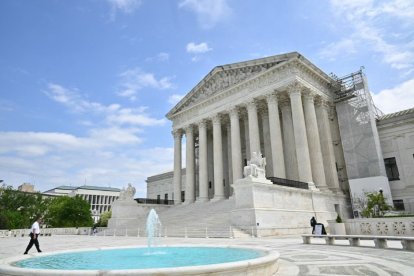The Supreme Court makes it clear: Americans cannot grant citizenship to foreign spouses whose visas have been denied
The ruling, decided by a 6-3 majority, strengthens the authority of Congress and the Executive Branch in managing immigration policies without judicial intervention.

(Mandel Ngan / AFP)
This Friday, the Supreme Court rejected an appeal that sought to give American citizens the right to make decisions to deny immigrant visas to their foreign spouses in court.
The ruling, decided by a 6-3 majority, holds that Americans do not have the legal right to bring their foreign spouses to the country and cannot challenge a consular official's visa denial to a foreigner. This decision, written by Judge Amy Coney Barrett, reinforces the control of Congress and the Executive Branch over immigration policies without judicial intervention.
Context of the case
The case, Department of State v. Muñoz, centers on the doctrine of "consular nonreviewability." This doctrine establishes that decisions by consular officials to deny visas to foreigners cannot be judicially reviewed. Proponents of the doctrine argued that an amendment could weaken the immigration system and make it more difficult to process applications. On the other hand, supporters of greater openness in immigration maintain that making this doctrine more flexible would respect constitutional rights and protect the institution of marriage.
The case dates back to 2005, when Luis Asencio-Cordero, a Salvadoran citizen, arrived in the United States. In 2010, he married Sandra Muñoz, a U.S. citizen, and they had a son, although Asencio-Cordero was in the country illegally. In 2015, Sandra Muñoz sponsored her husband to obtain an immigrant visa, and he returned to El Salvador to complete the process. During his consular interview, officials focused on his tattoos and criminal record and ultimately denied the visa, deeming him criminally inadmissible to the United States under the Immigration and Nationality Act.
In denying the visa, officials cited a passage from the Immigration and Nationality Act, which reads: “Any alien who a consular officer or the Attorney General knows, or has reasonable ground to believe, seeks to enter the United States to engage solely, principally, or incidentally in ... any other unlawful activity” was inadmissible.
Muñoz filed a lawsuit over the government's decision. During the court process, it was revealed that the government considered Asencio-Cordero a member of the Mara Salvatrucha criminal organization based on his interview, criminal record, and tattoos. Asencio-Cordero denied any affiliation with the gang.
The federal district court ruled in favor of the government in 2021, highlighting that the consular officer's decision was based on legitimate and good faith reasons, protected by the doctrine of consular non-reviewability, something the Supreme Court has now reaffirmed.
RECOMMENDATION





















